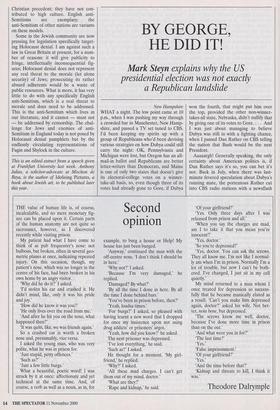Second opinion
THE value of human life is, of course, incalculable, and no mere monetary fig- ure can be placed upon it. Certain parts of the human anatomy are not quite so sacrosanct, however, as I discovered recently while visiting prison.
My patient had what I have come to think of as pub frequenter's nose: not bulbous, but broken, often in several geo- metric planes at once, indicating repeated injury. On this occasion, though, my patient's nose, which was no longer in the centre of his face, had been broken in his own home by an angry visitor.
`Why did he do it?' I asked.
`I'd stolen his car and crashed it. He didn't mind, like, only it was his pride and joy.'
`How did he know it was you?'
`He only lives over the road from me.' `And after he hit you on the nose, what happened then?'
`It was quits, like, we was friends again.' So a crashed car is worth a broken nose and, presumably, vice versa.
I asked the young man, who was very polite, what he was in prison for.
`Just stupid, petty offences.'
`Such as?'
`Just a few little burgs.'
What a beautiful, poetic word! I was struck by it at once: affectionate and yet technical at the same time. And, of course, a verb as well as a noun, as in, for example, to burg a house or Help! My house has just been burged.
`Anyway,' continued the man with the off-centre nose, 'I don't think I should be in here.'
`Why not?' I asked.
`Because I'm very damaged,' he replied.
`Damaged? By what?'
`By all the time I done in here. By all the time I done behind bars.'
`You've been in prison before, then?'
`Yeah, loadsa times.'
`For burgs?' I asked, so pleased with having learnt a new word that I dropped for once my insistence upon not using drug addicts' or prisoners' argot.
`Yeah, how did you know?' he asked.
The next prisoner was depressed.
`I've lost everything,' he said.
`Such as?' I asked.
He thought for a moment. 'My girl- friend,' he replied.
`Why?' I asked.
`All these mad charges. I can't get them out of my mind, doctor.'
`What are they?'
`Rape and kidnap,' he said. `Of your girlfriend?'
`Yes. Only three days after I was released from prison and all.'
`When you say the charges are mad, am I to take it that you mean you're innocent?'
`Yes, doctor.'
`So you're depressed?'
`Yes, doctor. You can ask the screws. They all know me. I'm not like I normal- ly am when I'm in prison. Normally I'm a lot of trouble, but now I can't be both- ered. I've changed, I just sit in my cell quietly.'
My mind returned to a man whom I once treated for depression so success- fully that he became manically elated as a result. 'Can't you make him depressed again, doctor?' asked his wife. Not bet- ter, nota bene, but depressed.
`The screws know me well, doctor, because I've done more time in prison than on the out.'
`And what were you in for?'
`The last time?'
`Yes.'
`False imprisonment.'
`Of your girlfriend?'
`Yes.'
`And the time before that?'
`Kidnap and threats to kill, I think it was.'
Theodore Dalrymple


























































































 Previous page
Previous page